"Polymarket is finally coming home," said Shayne Coplan, the founder of Polymarket and an American, who couldn't hide his excitement and expressed his feelings multiple times on social media.
If there is any project that has emerged from the crypto space to disrupt and change traditional forms without issuing a token, Polymarket undoubtedly stands out as the most significant one. This prediction platform, which influenced the U.S. elections, recently acquired the small derivatives trading platform QCX for $112 million. With QCX's "license," Polymarket can finally legally reopen its services to U.S. users.
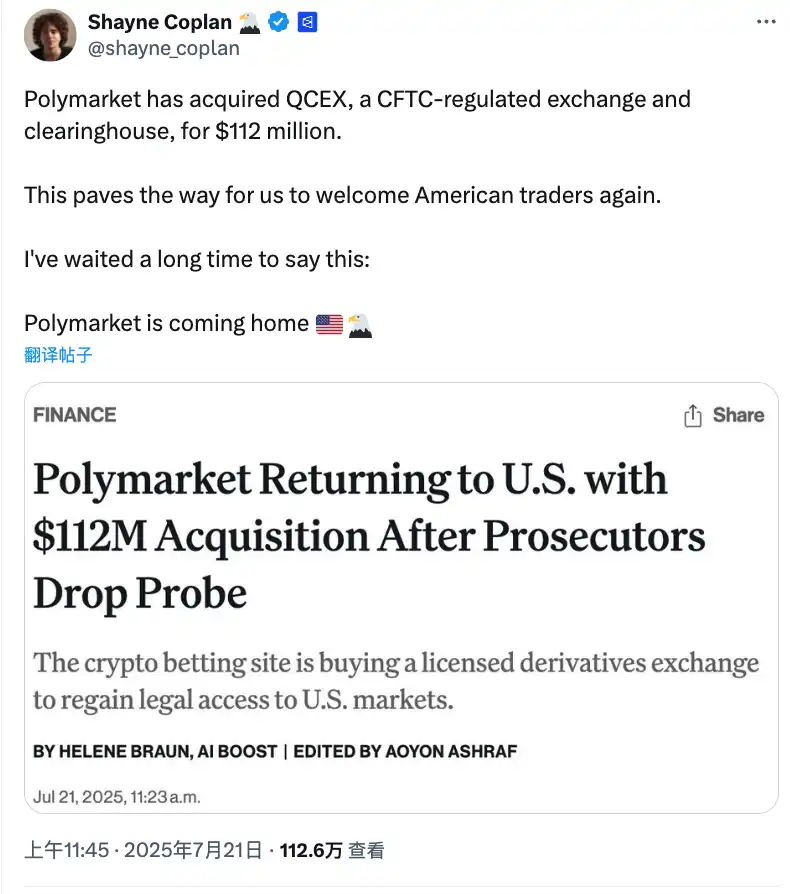
Polymarket founder Shayne Coplan is very excited about officially returning to the U.S. market.
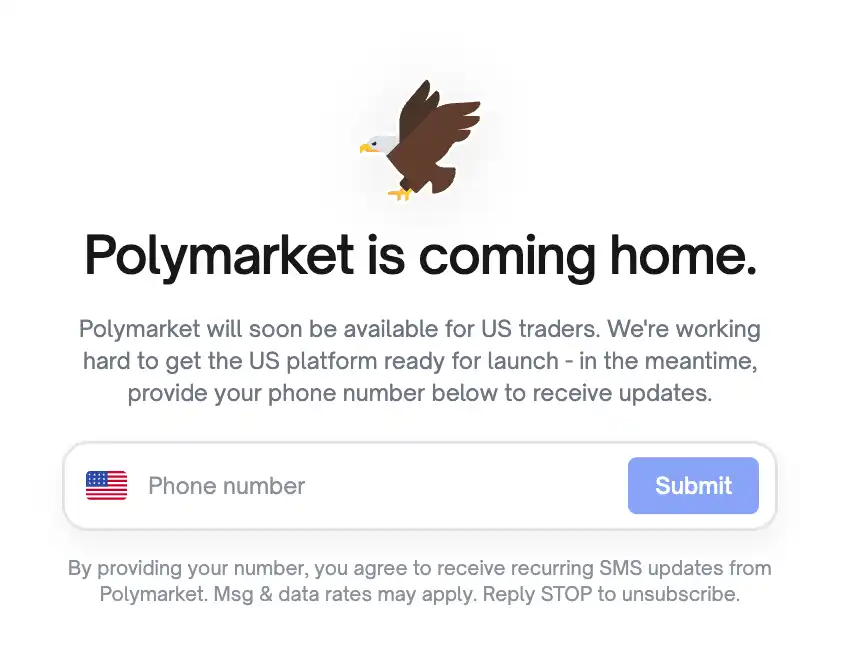
Looking back over the past three years, Polymarket's journey in the U.S. has not been smooth. In 2022, due to not obtaining a compliant derivatives license, Polymarket was sued by the CFTC and fined $1.4 million, and was forced to "commit" to exiting the U.S. market, blocking U.S. users.
The 2024 U.S. election is also the year when Polymarket gained fame, thanks to its accurate predictions of Trump's victory and explosive trading volume, becoming the media's favored "on-chain public opinion." However, this also made the platform a key target for investigations by the U.S. Department of Justice (DOJ) and the CFTC. Even founder Shayne Coplan's apartment in New York City was raided by federal authorities, who confiscated all his laptops. Although no charges were ultimately filed, this regulatory pressure once put Polymarket on the "edge of life and death."
Until 2025, when the situation took a turn for the better. With the Trump administration coming to power, the crypto industry received strong signals of policy relaxation. The U.S. DOJ and CFTC announced the formal end of all investigations into Polymarket, paving the way for its return to the U.S.

Polymarket founder Shayne Coplan got his phone back.
Instead of slowly building a compliance application and waiting three to five years for approval, it is more common in the crypto space to "directly buy a ready-made one," which is a typical compliance "shell" tactic.
There is little public information available online about QCX, and it is relatively unknown. From the limited information, it can be found that this small derivatives trading platform began applying for dual licenses of DCM (Designated Contract Market) and DCO (Clearing Organization) in 2022, and was officially approved only on July 9, 2025. This compliance shell is considered a "scarce resource" in the U.S. digital asset industry—only platforms with DCM/DCO licenses can truly open channels for U.S. domestic traders, brokers, and large capital users for USD deposits, settlements, and legal prediction contract trading.
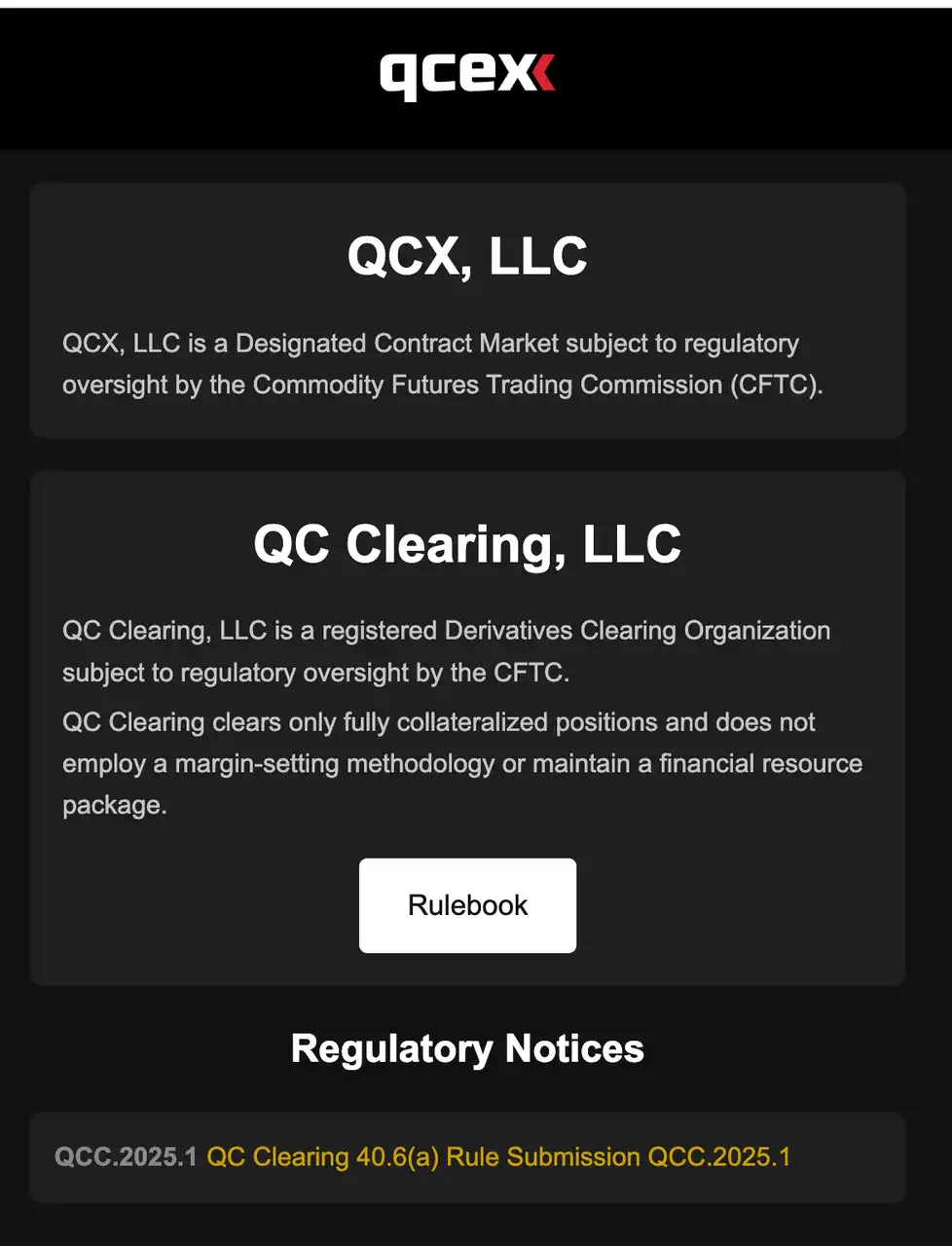
Polymarket spent $112 million to complete the acquisition, which is almost a perfect example of "exchanging money for time." Compared to the uncertainty of years of self-building and regulatory games, this move directly opened the door to the mainstream U.S. market, allowing the platform to potentially transform overnight from an "illegal gray market" to a "compliant giant in the U.S."
According to Similarweb data, 25% of visitors to the Polymarket website come from the U.S., with the next four countries being Canada (6.3%), the Netherlands (6%), Vietnam (5.9%), and Mexico (5%). Before the CFTC settlement, the U.S. market share was between 34% and 54%. Although Polymarket prohibited U.S. users from using the platform, the market demand has always been there; it just became more "underground." For example, users can still access Polymarket through virtual networks, and another workaround is using a Telegram bot based on Polymarket, which can also bypass KYC.
After acquiring QCX, Polymarket quickly made its way to the front of app stores, and community enthusiasm surged, seemingly signaling that another round of explosion in decentralized prediction markets is about to come.
How will Polymarket change its "algorithm" amid the "suit controversy"?
Unlike traditional centralized prediction platforms, Polymarket adopts a decentralized settlement method. Although this greatly enhances innovation and efficiency, this settlement method also reveals some drawbacks, especially following the recent "suit" controversy involving Ukrainian President Zelensky on Polymarket.
The prediction "Will Zelensky appear in a suit before July?" became popular because Zelensky has mostly worn camouflage military uniforms in the past, and his wearing a suit would be seen as a significant event. After the actual meeting, the question of whether Zelensky wore a "suit" that day sparked huge controversy.
Why? Because Zelensky wore a dark jacket with a shirt and tie that day, which looked very "formal," but did not fully meet the traditional definition of a suit. Moreover, media reports varied: some claimed he wore a suit, while others disagreed. As a result, users betting on "will wear a suit" and "will not wear a suit" on Polymarket each sought evidence and news, arguing endlessly on social media. Since this type of market settlement relies on UMA's optimistic oracle (i.e., community proposals + voting decisions), the final market outcome was determined by a vote from a group of UMA token holders.
However, the voting process for this event erupted into serious divisions—most ordinary participants believed "Zelensky did not wear a traditional suit," but due to the highly concentrated voting power of UMA, whale accounts (large holders) held the vast majority of voting rights. They concentrated their votes to conclude "Yes, Zelensky wore a suit." This led to an uproar among users betting "will not wear," who questioned the fairness of the ruling and even accused of vote manipulation or "bribery."
UMA officially acknowledged that such highly subjective on-chain predictions require a higher-dimensional security and diverse decision-making mechanism. Relying solely on token voting and simple Schelling Point can indeed be easily influenced by capital power. As for how to make prediction market decisions more fair and effective, the Polymarket team seems to be continuously pushing for upgrades.
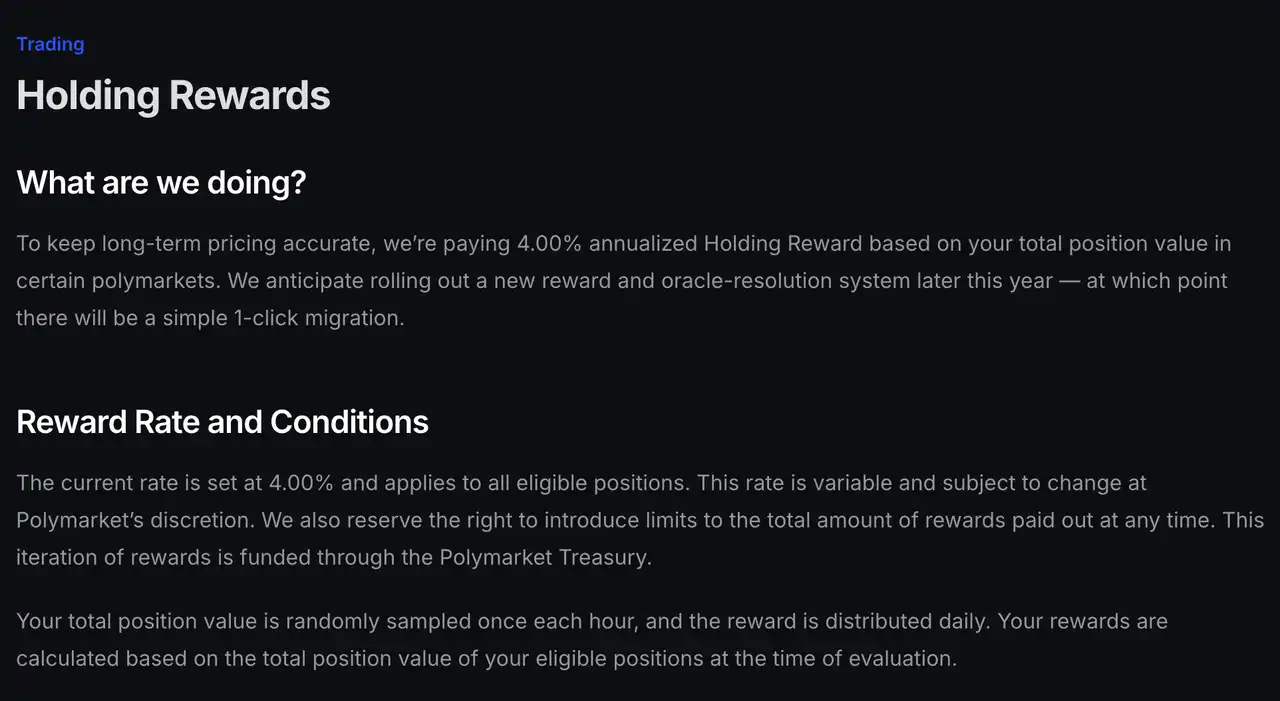
Currently, Polymarket has launched a 4% annualized reward for positions on the 2028 U.S. election and stated that it expects to introduce new rewards and oracle solution systems later this year.
According to UMA's announcement earlier this year, "UMA and Polymarket are building the next-generation prediction market oracle using EigenLayer," we can see that UMA, Polymarket, and EigenLayer are researching further methods to identify bribery as intersubjective truth. This will enable the next generation of oracles to handle more subjective prediction market analysis tasks while benefiting from the additional intersubjective security provided by EigenLayer and the EIGEN token, thus preventing bribery.
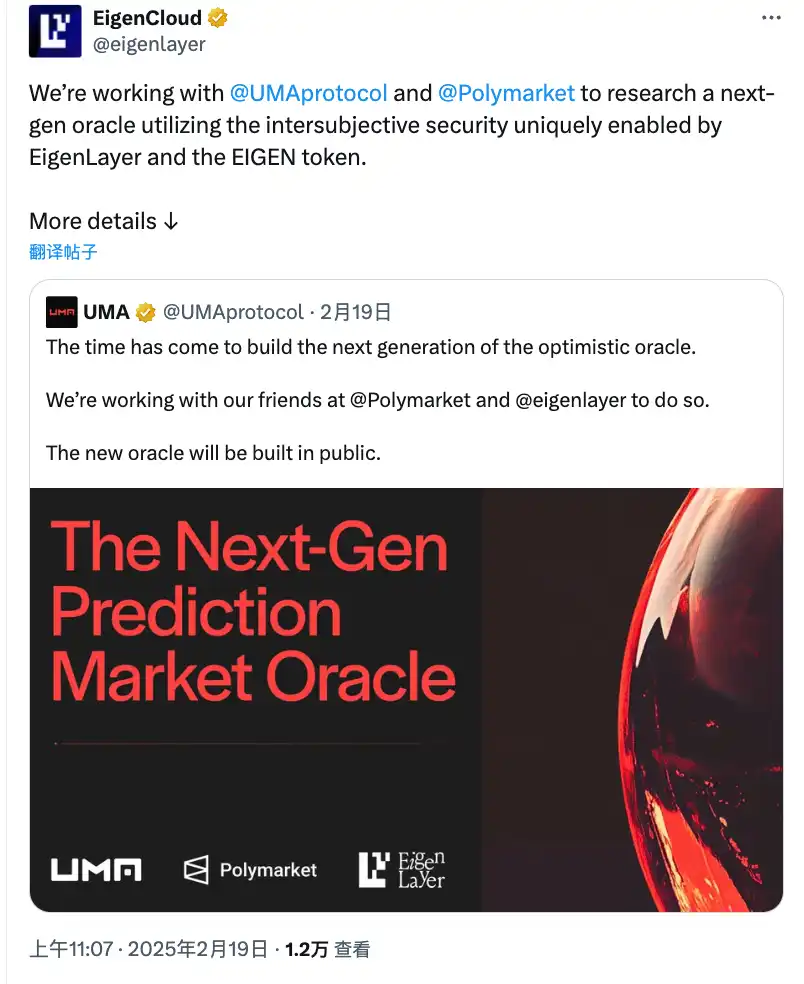
The UMA oracle (Optimistic Oracle) is currently one of the few solutions in the industry capable of handling complex issues and disputes. Its mechanism is: first, someone (or AI) provides an answer, then it is opened for community and UMA token holders to vote. If someone questions it, they can raise an objection, entering arbitration.
The arbitration process will use a "Schelling Point" theory, allowing voters to maximize their interests by spontaneously choosing the answer that is most likely to be "what the majority thinks is correct." UMA's "optimistic oracle" has a high efficiency advantage, but the drawbacks of "bribery attacks" are also very obvious, such as large holders privately buying off voters to create false rulings together. This has also been a point of criticism for Polymarket for a long time.
From the article, we can see several directions:
First, dynamic bonding and variable challenge periods. As the name suggests, this means no longer setting a one-size-fits-all deposit amount and dispute handling standards for all markets, but flexibly adjusting based on each market's actual activity, risk, and betting amounts. For example, for a market like "election results," which has high controversy, significant impact, and high betting amounts, ample time should be given for everyone to investigate and appeal. Higher deposits and longer arbitration periods can prevent malicious operations. For smaller markets, such as "Will it rain tomorrow?" or "Bitcoin price," the deposit and arbitration time can be lower, more efficient, and the cycle can be compressed or even automatically settled.
Moreover, with the development of AI technology, Polymarket is also actively trying to involve AI robots in the decision-making process. AI can quickly and automatically gather diverse information from mainstream media, news, images, etc., to make preliminary judgments on factual results or assist in organizing evidence, helping community members reduce a lot of repetitive verification work. At the same time, AI can also monitor potential abnormal voting behaviors or data fluctuations, issuing early warnings to assist humans in making more rational and scientific judgments. Although AI currently does not directly determine market outcomes, its "assisted decision-making" capability is quietly changing the decision-making process, pushing the entire prediction market towards a more efficient and intelligent evolution.
Preventing large holders from bribing and manipulating results is another tricky issue in decentralized governance. In the past, if whale players colluded to buy off voters, it was entirely possible to hijack market fairness. To address this, Polymarket has introduced the "re-staking" mechanism from the new Ethereum ecosystem project EigenLayer. In simple terms, any voter wishing to participate in the decision-making must put up ETH or other mainstream assets as a deposit and agree that if they are found to have committed wrongdoing or colluded to cheat, these deposits will be directly forfeited. This high economic cost significantly raises the threshold for cheating, making it very costly for attackers to attempt manipulation, thus providing ordinary users with a greater sense of security and trust. EigenLayer is also researching what is called "subjective security," which aims to converge on a maximum common denominator of "on-chain truth" for highly controversial or subjective market issues through more dimensions of community participation and diverse deposit assets.
In short, merely holding UMA tokens makes it difficult to hijack the entire prediction outcome. In the future, Polymarket may introduce ETH and other tokens that are harder for large holders to manipulate as synthetic assets, and many netizens speculate that there may be a community token for Polymarket itself.
This also leads to discussions about Polymarket's next capital route: to issue a token or to go public with an IPO?
Is issuing a token a better way out?
"Why not just issue a token for incentives?" This sentiment is quite typical; some feel that going through synthetic assets, oracle profit-sharing, and re-staking ultimately leads back to the most direct "issue token - airdrop - incentivize," so why not lay all the cards on the table from the start? However, from the perspective of governance and security, many still value the new mechanism. For example, by designing mechanisms to disperse the influence of a single large holder, allowing the platform's native token and external tokens (like UMA and ETH) to participate in decision-making and staking together, and embedding a multi-token structure into the underlying rules, it aims to ensure that every market and participant has a sense of belonging and voice. This approach not only provides redundancy in security but also guarantees community vitality.
If Polymarket truly chooses to issue a token, the changes would not be limited to the economic level. First, the mechanism itself would be much more flexible than single-chain governance, supporting different markets to vote and arbitrate with different tokens, allowing the community to adjust voting weights and thresholds, turning the diversity in Web3 scenarios into an advantage. Secondly, issuing a token can directly drive community consensus, stimulate more real users to be active, contribute content, and participate in governance, combining DAO and "on-chain gamified operations" into a self-reinforcing positive feedback loop. The benefits from the capital market would also be significant; whether users, LPs, market makers, or developers, they would be willing to hold tokens and participate, driving liquidity and strengthening the ecosystem.
More importantly, after issuing a token, Polymarket could seamlessly connect with DeFi, liquidity pools, cross-chain protocols, and other infrastructures, easily embedding various new plays of Web3 native finance, such as staking, lending, synthetic assets, and even multi-chain governance. This means "on-chain is a global market," eliminating concerns about which country's securities laws might pose a problem, allowing community autonomy, distributed governance, and financial innovation to run simultaneously. More flexible incentive and profit-sharing models could also directly return platform earnings to token holders, stimulating governance enthusiasm and attracting long-term capital to the protocol.
However, from another perspective, if Polymarket chooses the IPO route, the benefits are also considerable. The biggest advantage is, of course, legality and compliance, allowing it to legitimately obtain "passports" for major financial markets in the U.S., Europe, and beyond, attracting mainstream institutions and large funds, with backing and credit ratings rising accordingly. Collaborating with banks, brokerages, and leading trading platforms would no longer be restricted by identity, and it could even directly enter the traditional financial traffic battleground. The financing stability brought by going public should not be underestimated; the money raised through an IPO would not be affected by plummeting token prices or market sentiment fluctuations, ensuring the platform's survival. Additionally, equity value is generally perceived as more stable among mainstream investors, with much lower bubble risks compared to the crypto space.
The governance advantages of a public company are also prominent. A board of directors, accountability systems, and a professional executive team—these "standard configurations" in the traditional financial world are all beneficial for long-term strategy, risk control, and team upgrades. Not to mention that tax policies and regulatory rules are clearer and more transparent, allowing for compliant expansion globally, truly minimizing "black swan" risks.
Of course, the costs of going public are also clearly visible. First, there would be a significant decrease in innovation speed and mechanism flexibility. All product innovations, protocol upgrades, and incentive model adjustments would have to go through lengthy legal and compliance processes, even for minor changes. Compared to on-chain DAO decision-making, the speed would lag significantly. Many new plays in DeFi, DAO, or even on-chain governance and multi-token voting would get stuck in compliance reviews, and the sensitivity to market reactions would gradually decrease. A more practical issue is that after going public, Polymarket's sense of co-construction with the Web3 community would be diluted. Under the traditional public listing model, users would find it difficult to participate in protocol profit-sharing and daily governance like token holders, and community vitality and self-organizing power could easily be weakened. For emerging community users who enjoy the fast-paced, highly interactive, and co-creative atmosphere of on-chain environments, "traditional IPO" may not be very appealing, and market penetration may not be faster than purely Web3 projects.
However, we can also imagine that as the crypto space gradually becomes a mainstream part of the financial market, a dual hybrid route like Token + IPO may also be realized in Polymarket.
免责声明:本文章仅代表作者个人观点,不代表本平台的立场和观点。本文章仅供信息分享,不构成对任何人的任何投资建议。用户与作者之间的任何争议,与本平台无关。如网页中刊载的文章或图片涉及侵权,请提供相关的权利证明和身份证明发送邮件到support@aicoin.com,本平台相关工作人员将会进行核查。




